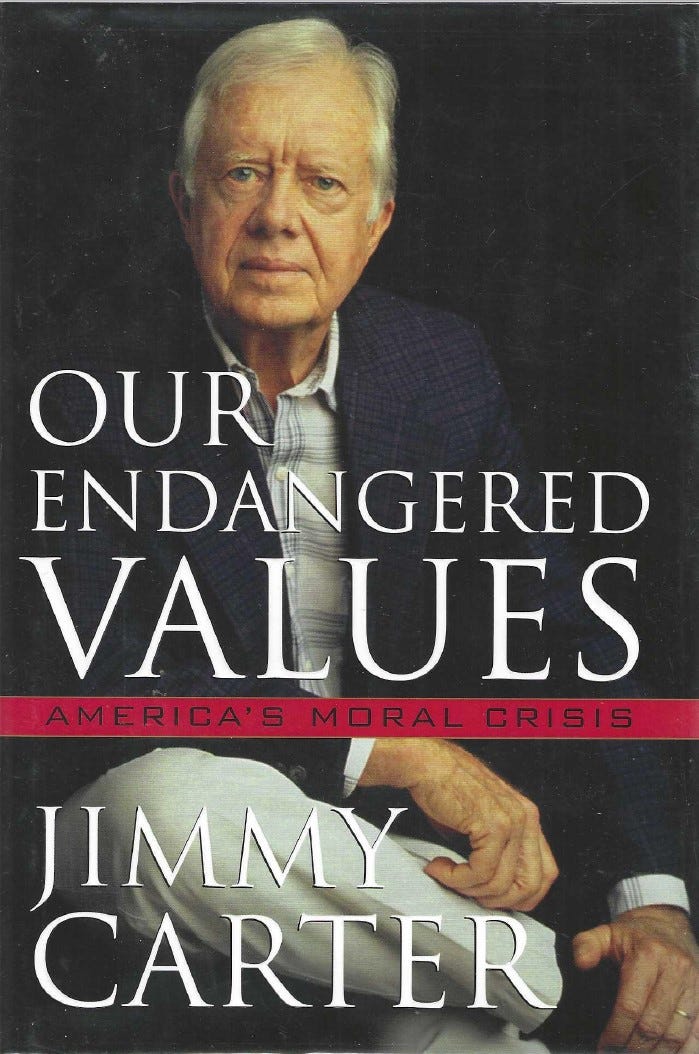This is a book Jimmy Carter published in 2005, back when he was only 80 or so and when Dick Cheney was in charge of the national government.1
He noted there:
One of the facts that I had to accept from my first day in office [as President] was that enemy intercontinental nuclear warheads, once launched, would require only twenty-six minutes to reach Washington, New York, and other American targets. During this brief interval, it was my sole responsibility as commander in chief to decide on our response.
There has never been any effective means of destroying an incoming intercontinental missile, and the Anti-Ballistic Missile Treaty between the nuclear weapon states specifically prevented atte1npts to develop such a defense. Under those circumstances, the only options were to launch a counterattack or to accept the horrible damage without response. My choice, obviously, was to avoid the possibility of this scenario, known by the appropriate acronym "MAD" (mutual assured destruction), by convincing the Soviets of our ability and resolve to respond, and through effective diplomacy topreserve the peace and protectAmerican interests. [my emphasis]
That’s a good basic statement of what is still a key concept of nuclear deterrence. Some of our New Cold Warriors have lately been mocking the entire idea that the US or other Western governments should take the possibility of Russian use of nuclear weapons into account at all when deciding on policy related to the Russia-Ukraine War.
But that wasn’t the world we lived in 1977, when Carter became President, and it’s not the one we live in now.
Thomas Karel wrote the following mini-review for the Library Journal. As his summary indicates, Carter was not focused on advocating more trash-talking against trans people. Or on the need to purge public schools of any document that might suggest that white racism might ever have existed anywhere in the United States.
It's also a reminder of how the vocabulary has changed in the last 18 years. Karel refers to what we now commonly call the climate crisis as "the dilution of environmental quality." It’s been considerably more “diluted” since!
[Carter] is dismayed by the influence of fundamentalism both in religion and in politics [and this was 18 years ago!]; as he observes, ’Narrowly defined theological beliefs have been adopted as the rigid agenda of a political party’." He further accuses the neoconservatives who guide the Bush administration of having imperialistic goals.
Carter writes at length about post-9/11 human rights violations, gun control, nuclear proliferation, the death penalty, the dilution of environmental quality, and the dangers of preemptive war. He passionately encourages women to demand a greater leadership role in the church while candidly discussing his own religious beliefs and struggles with the Baptist Church.
However, his most cohesive chapter is concerned with the growing gap between rich and poor, which he calls the greatest challenge facing the world in this new century. This book is an eloquent personal testament that deserves a wide readership, regardless of political affiliation. Highly recommended.“2
Carter, Jimmy (2005): Our Endangered Values: America's Moral Crisis. New York/London/Toronto/Sydney: Simon & Schuster.
Karel, Thomas (2010): In: Our endangered values: [America's moral crisis] (Audio CD), Published Reviews. Colorado Mountain College website. <https://cmc.marmot.org/Record/.b26097758> (Accessed: 2023-07-04). Paragraph breaks added.



